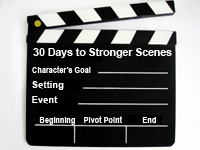Climax Scene: The Biggest of the Big Scenes
 30 Days to a Stronger Scene Table of Contents
30 Days to a Stronger Scene Table of Contents
Featured Today in Fiction Notes Stores
The climax scene of a story is extremely important. It’s the point at which everything comes to a head and is resolved. If you think about big scenes, this is the biggest: big in action, big in emotion, big in impact on characters, big in the length of the scene.
- Direct Conflict. The main character and antagonist/villain must be present and must go head to head in the climax of the story. No substitutes allowed for either. You may have henchmen stand in for the villain at other points of the story, but not in the climax.
- And so, a word about Villains. One question I often hear is, “Do I really need an antagonist/villain” Usually, these writers have the main character struggling against something like a storm, or an evil empire, or something more abstract. In these cases, no, you don’t have to have a villain; but if you can embody the evil from that abstract opposition in a character, you’ll have a stronger story. Think about Star Wars, where Luke Skywalker struggles against the evil Empire. Even in that space opera, you have the local representative and embodiment of the evil in Darth Vadar. Strengthen villains whenever possible.
- You must write the climax.
No fair turning the page and reading, “The next morning, she thought about the fight with Jeremiah.” Write the thing. Don’t avoid the emotional toll it will take on you as a writer; you must write the climax as a SCENE. If there’s ever a place where a flashback is inappropriate, this is it. Do the outer and inner conflicts come together in the climax? If not, revise for that. - Solve the problem you set up. The climax must refer back to the original problem you set up for the main character/novel through-line. Even if the character’s goal has morphed in some way, it should still relate to the original set-up. Else, change the opening; or change the climax to match up with the original opening, your choice.
- Emotional Costs? What cost does the main character have to pay for success? Success can’t come easily in the climax and there must be an emotional cost to pay. Else why would the reader stay with you?

I’m there in my revisions and need to change a passive climax (as in, something outside of the protagonist ultimately took care of things) to an active one. Oy!
I do have a sacrifice in mind, I just need to be sure it fits the character and the story. Simple, right? :-)
Well, maybe not simple. But if you know the problem and can articulate it so well, the answer will come.
Darcy